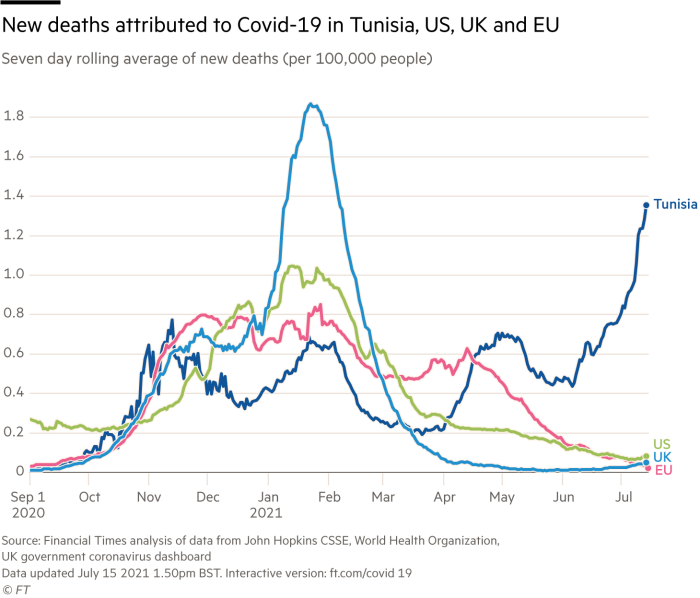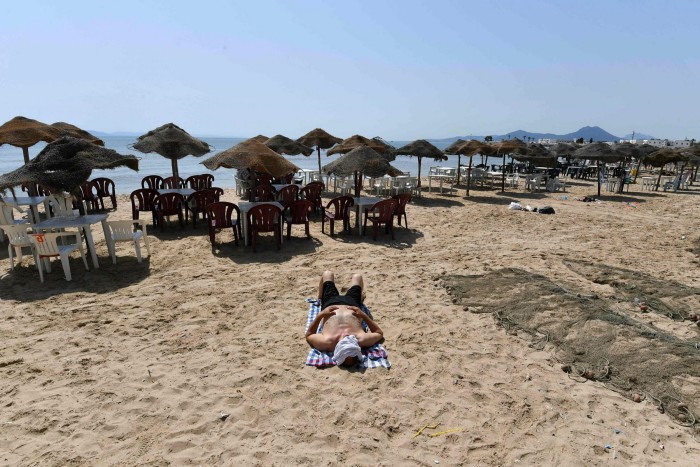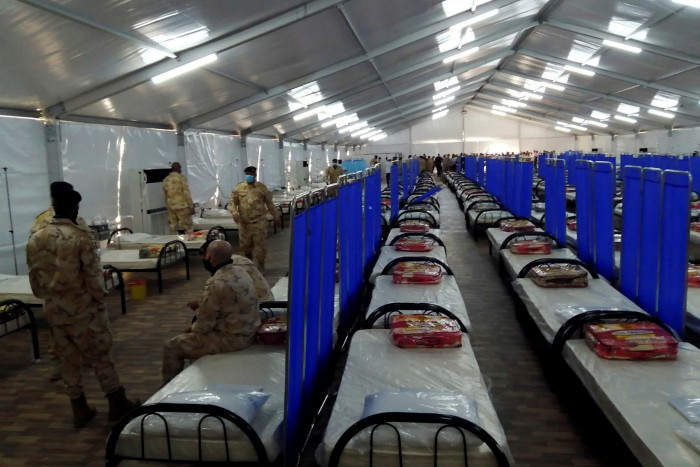[ad_1]
A fast-deteriorating health situation has added to Tunisia’s political and economic woes as the aggressive Delta variant of coronavirus takes hold in a country with low vaccinations and the Arab world’s highest Covid-19 death rate.
The World Health Organization said that after keeping infections under control last year, Tunisia was now facing an “extremely concerning†surge in cases. Only 7 per cent of the North African country’s population is fully vaccinated. With chaotic scenes in hospitals and vaccination centres across the country, the president late on Wednesday put the military in charge of the pandemic response.
Intensive care units are almost full with some hospitals experiencing shortages of oxygen, which is crucial for Covid-19 patients suffering breathing difficulties. Last week, the daily death toll surpassed 200 — a record for the north African country of 12m people, where nearly 18,000 people in total have already died.
While Tunisia is seen as the only democracy among Arab countries, which rose up against dictatorship in 2011, the deteriorating health situation is testing the limits of a political system riven by disputes between the president, prime minister and speaker of parliament.
President Kais Saied’s decision came a day after Hichem Mechichi, the prime minister, sacked the health minister following chaotic scenes at undersupplied vaccination centres. The move is seen as an escalation of a power struggle between the pair that has exacerbated Tunisia’s economic problems.
“This is a deepening of the political crisis and the polarisation between the two men,†said Youssef Cherif, a political analyst who is head of the Columbia Global Center in Tunis.
While pointing out that Tunisian citizens had not been “serious about wearing masks and avoiding family gatheringsâ€, he said the government had “mismanaged the health crisis by not being prepared for the influx of casesâ€.
“Covid in general has not been the first priority of the president, the government and the speaker,†Cherif added. “The three of them kept fighting their daily political quarrels rather than addressing the crisis.â€
Mechichi accused the health minister of making “populist†and “criminal†decisions after tens of thousands of people turned up at 29 new vaccination centres only to find out there were not enough vaccines to go round. Fatima, a 33-year-old science professor, queued up outside a sports centre in the town of Marsa to get a shot. “I’m scared,†she said. “This is the worst wave. The health system is in trouble and hospitals don’t even have oxygen.â€
As many as 9,500 cases are being reported daily, the WHO said, “with wide circulation of the Delta variantâ€. Jalila Ben Khalil, a government health spokeswoman, said the variant accounted for more than 75 per cent of Covid-19 patients admitted to hospital with lung problems.

The true figures are likely to be much higher than those reported, because of the pressure to save tests, said Fethi Balti, a doctor at a hospital in northern Tunisia. “We only test those who require medical attention or who have other symptoms,†he added.
The political situation has only exacerbated the crisis. In recent years, a succession of weak governments has struggled to provide effective leadership or invigorate the moribund economy. Saied, a populist elected in 2019, has refused since January to swear in 11 ministers selected by Meshishi, who had sacked those seen as Saied appointees.Â
The stand-off between the three leaders, in addition to bitter disagreements between rival factions that have at times escalated into violent brawls in parliament, has diminished trust in the political system, analysts say.
“There isn’t even a government to start with,†said a restaurant owner in La Marsa, near Tunis. “They take a decision in the morning and reverse it in the afternoon. They decide on a quarantine and don’t really implement it on the ground.â€
The pandemic has also worsened the economic situation in a heavily indebted country, where there are frequent eruptions of protests by young people angry about poverty and high unemployment.
The economy contracted last year by 8.8 per cent, according to the IMF, and despite projections of 3.8 per cent growth in 2021, it will not recover to its pre-pandemic level this year. Tunisia’s tourism industry has been decimated because of European and UK travel restrictions.

James Swanston, economist at London-based consultancy Capital Economics, said foreign currency losses could weaken the Tunisian dinar “causing an inflationary risk and increasing the cost of livingâ€. Tunisia might struggle to meet its debt repayments, he said. “No government in place . . . means you can’t have momentum to address the economic crisis,†he added.
Negotiations with the IMF on a $4bn loan seen as crucial to helping the government’s overstretched finances have stalled while its debt heads towards 90 per cent of gross domestic product.
Faced with regular outbreaks of civil unrest, the government has found it difficult to implement the necessary measures to limit spending, such as a freeze on the public sector wages that account for 17.6 per cent of GDP, analysts say. “Fiscal consolidation measures aren’t popular at the best of times,†added Swanston.
With the arrival of vaccines and medical supplies donated by countries including China, France, Italy, Saudi Arabia, Egypt, Algeria and the United Arab Emirates, Cherif said the situation was likely to improve in the coming weeks.
But while the military being “dragged into politics indirectly†could have a positive impact on the health situation, he added, it could have “a negative one on the future of Tunisia as a democracyâ€.
The surge in infections has encouraged more people to wear masks. Yusser, a saleswoman at a clothing store, pulled hers up when customers entered. “People have become frightened,†she said. “Some of the sick don’t even show symptoms.â€
[ad_2]
Source link







